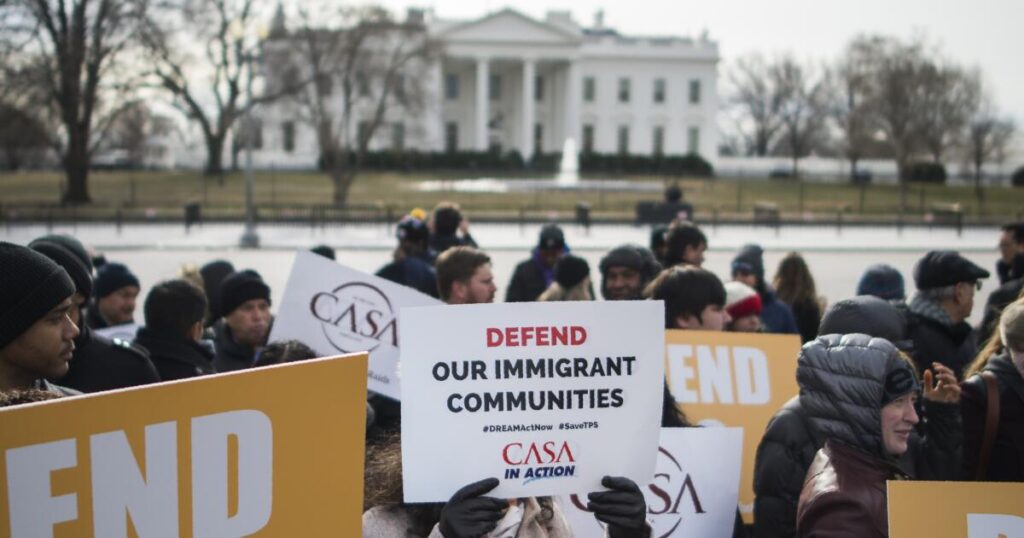WASHINGTON — Democratic lawmakers including California Sen. Alex Padilla are urging President Biden to take action now to protect immigrants with temporary legal statuses and work authorizations.
President-elect Donald Trump has vowed to move quickly to crack down on immigrants once he takes office, including mass deportations.
The lawmakers said during a news conference Wednesday that protecting hundreds of thousands of immigrants was not just a moral imperative, but an economic priority as well.
“By taking work authorization for hundreds of thousands of workers away, we’re gutting our own workforce,” Padilla said. “For all the voters who turned out in November, who told campaigns and pollsters that top of mind for them was the high cost of living, the cost of housing, the price of food and so much more: Let’s be clear that mass deportations will directly result in an economic disaster and higher prices.”
Sen. Catherine Cortez Masto of Nevada said White House officials told her they are considering the request, but have offered no timetable for when they could act. The White House did not immediately respond to a request for comment.
She and Padilla, along with Sen. Ben Ray Luján of New Mexico, sent Biden a letter last week asking him to redesignate eligible countries, including Nicaragua, El Salvador and Venezuela, for Temporary Protected Status, and to designate Ecuador for protections.
They also urged Biden to expedite processing of applications for Deferred Action for Childhood Arrivals, an Obama-era program granting work permits and deportation protections to certain immigrants brought to the U.S. as children.
California is home to about 68,000 Temporary Protected Status holders and 150,000 DACA recipients.
Temporary Protected Status is a presidential authority that allows people to live and work in the U.S. when conditions in their home country, such as war or environmental disaster, make it unsafe to return. More than 860,000 immigrants from 17 countries are protected under the program, which the Biden administration significantly expanded.
The program’s protection is granted for up to 18 months. Protections for some countries are due to end soon; designations for El Salvador, Honduras, Nicaragua, Nepal and Sudan, for instance, expire in March. Renewing them now would buy those immigrants more time to work legally and seek out alternative legal options.
During his first term, Trump revoked the humanitarian protections for people from several countries, but a class-action lawsuit kept their protections in place until the Biden administration took office and reversed Trump’s move.
It is widely anticipated that Trump will attempt to revoke the protections or let them expire soon after being sworn in.
The plea by lawmakers and advocates comes after Trump said on NBC’s “Meet the Press” that the only way to prevent families from being separated is to deport them all, including children who are U.S. citizens. Trump also said he will “work with Democrats on a plan” to help DACA recipients remain in the country.
The Senate Judiciary Committee held a hearing on Tuesday titled, “How mass deportations will separate American families, harm our armed forces, and devastate our economy.”
In a floor speech previewing the hearing a day earlier, Sen. Richard J. Durbin (D-Ill.) said there’s reason to be skeptical, if not cynical, of Trump’s promises to work with Democrats.
“[In his] last term, President-elect Trump walked away from four different bipartisan compromises with Democrats to solve the DACA crisis,” Durbin said. “Democrats were willing to provide billions of dollars, at one point, for President Trump’s unpopular border wall in exchange for a bipartisan Dream Act, but we just couldn’t seem to reach a positive answer.”
Andrea Flores, a former Biden White House official who is now vice president for immigration policy and campaigns at the advocacy group Fwd.us, said Biden’s decision to protect hundreds of thousands of immigrants from dangerous conditions is being politicized in the aftermath of the election.
She noted that Temporary Protected Status is a bipartisan law created in 1990, has been used by presidents of both political parties and requires “a sober legal assessment of the diplomatic foreign policy and country conditions.”
“Factors that are not in the law could potentially stop the Biden administration from acting,” she said. “The usage of TPS historically has always reflected the best of what our country does, which is to protect people fleeing harm from oppressive regimes. To fail to act now, to protect those people that we welcomed in and provided refuge to, would be a stain on the Biden administration’s legacy for years to come.”
